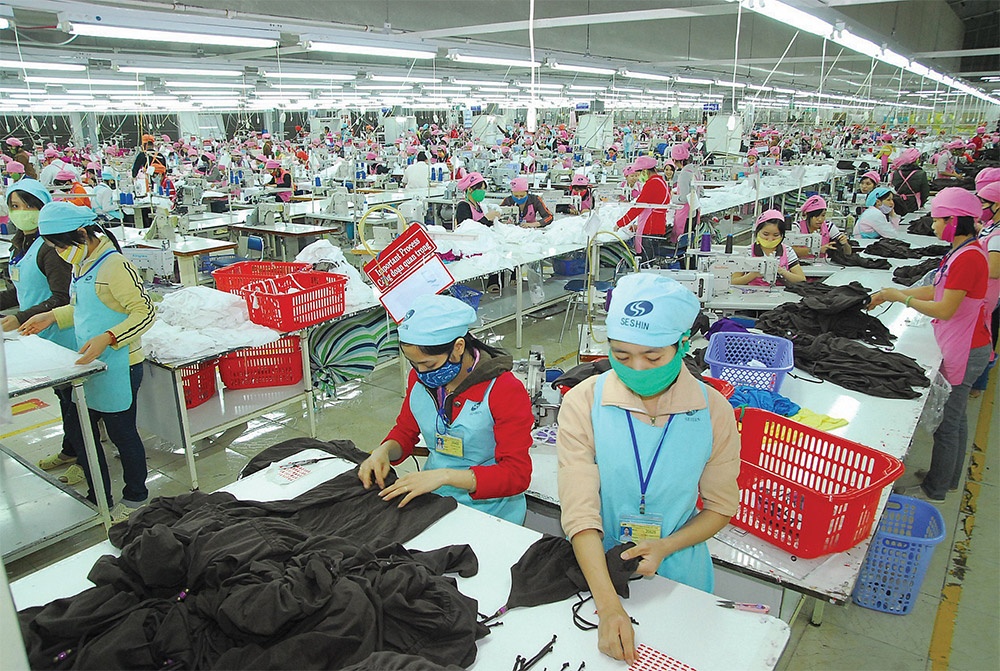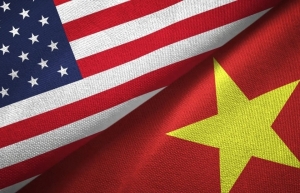US considers upgrading Vietnam’s economy status
US Ambassador to Vietnam Marc E. Knapper stated two weeks ago that the US government is currently reviewing Vietnam’s non-market economy status and its desire to receive market economy status.
 |
| US considers upgrading Vietnam’s economy status, illustration photo |
“This is something our Department of Commerce (DoC) is working on. There is a 270-day deadline to do this, which began in October 2023. The US government is committed to an impartial and transparent process that is consistent with international rules,” Knapper said.
“We look forward to the continued effort by our DoC to do this. And we look forward to continuing to work with Vietnam as we deepen and strengthen even further our country’s trade and investment relationship.”
The review also includes a public comment period before a determination is made. Thus the US will conclude the review in around mid-July this year.
On September 8, the Vietnamese government filed an official request that the DoC consider it a market economy citing the country’s economic reforms made in recent years.
Since the first anti-dumping investigation involving Vietnam in 2002, the US has considered Vietnam a non-market economy. According to US regulations, the determination of a market economy status is based on six criteria set by the DoC.
These criteria include the currency conversion rate, wage and labour negotiation issues, foreign investment levels, state and private ownership, government control over resources and prices, and other relevant factors.
Currently, the US categorises 12 countries as non-market economies in trade defence cases, which has a significant impact on Vietnamese businesses, especially in anti-dumping investigations.
The US assesses a Vietnamese product’s value based on what it is worth in a third country (a market economy) and then assumes this is the likely production cost to a Vietnamese company, rather than using data provided by the company itself.
This calculation causes the dumping margin to be pushed up very high and does not actually reflect the situation of Vietnamese companies, according to the Centre for WTO and International Trade managed by the Vietnam Chamber of Commerce and Industry.
If recognised, the market economy status will help Vietnam shun anti-dumping duties by the US, and Vietnam would be able to make their products more competitive in the US market, also meaning that Vietnam’s export-oriented manufacturing sector will develop further.
At present, the US is among the key export markets of Vietnam. Two-way trade between Vietnam and the US increased from $450 million in 1995 when the two countries established their diplomatic relations, to $110.6 billion last year. Vietnam is the US’ eighth-largest trading partner and its largest trading partner in ASEAN, while the US is Vietnam’s second-largest trading partner and its top export market.
“Vietnam is the US’ eighth largest trading partner and our largest trading partner in ASEAN, we are Vietnam’s second largest trading partner. And we are also Vietnam’s number one export market. You know, we firmly believe in the importance of Vietnam in terms of global supply chains,” Ambassador Knapper said.
During a state visit to Vietnam last September by US President Joe Biden, the two countries elevated ties to a comprehensive strategic partnership. President Biden and Vietnam Party General Secretary Nguyen Phu Trong reaffirmed the importance of economic, trade, and investment cooperation and innovation-driven inclusive economic growth as the core foundations and sources of momentum in the bilateral relationship.
Both sides pledged to create stronger conditions and facilitate the further opening of markets for each other’s goods and services, support trade and economic policy, and regulatory measures to achieve this aim; and to address issues such as market access barriers via the Trade and Investment Framework Agreement, said a joint leaders’ statement released during the visit.
“The US applauds Vietnam’s progress in significant market-based economic reforms, and affirms its enthusiasm and commitment for a broad, strengthened, supportive, and constructive engagement with Vietnam in its transition to a market economy, and subsequently to market economy country status, under US law,” the statement added.
Under the joint statement, the US noted Vietnam requested the review of its market economy status last September. The US will review Vietnam’s request as expeditiously as possible, in accordance with US law.
The US appreciates Vietnam’s ongoing efforts to further modernise and enhance the transparency of its monetary policy and exchange rate management framework, to promote macroeconomic stability, and to ensure the safety and soundness of the banking system, the joint address noted.
At the same time, the US also committed to work with Vietnam to help it to develop the semiconductor industry and other high-tech industries, as well as to build a workforce for the 21st century in terms of computer scientists, engineers, and IT workers who can help to work in the high-tech economy that Vietnam and the US aspire to.
It is expected that in late March, Vietnam and the US will jointly organise a dialouge at the foreign ministerial level in order to continue materialise the shared strong commitments made in the comprehensive strategic partnership. According to the Vietnamese Ministry of Foreign Affairs, the Vietnamese side will continue working with the US about the recognition of Vietnam as a market economy.
To date, 72 countries including major economies such as Canada, Australia, Japan, and South Korea have recognised Vietnam as a market economy. Most recently, the UK recognised Vietnam’s market economy status in a formal letter when it joined the Comprehensive and Progressive Agreement for Trans-Pacific Partnership. This recognition ensures that the UK will not apply unfavourable rules to Vietnamese imports in cases of trade defence investigations.
| The joint leaders’ statement announcing the comprehensive strategic partnership upgrade has reaffirmed the importance of trade and investment collaboration and highlighted innovation-driven economic growth as a foundation of the bilateral relationship. On the heels of this momentous occasion, US businesses should have much to be excited about in the Vietnam market. Previously, US firms were slow to take advantage of the growing opportunities that Vietnam presented. However, they are now increasingly looking towards this market as a key component to their growth strategy in Asia. There are five reasons explaining why US companies should consider exporting to Vietnam: - The fastest growing middle and affluent classes in the region, providing the right demographics for growth and receptivity to US products and services. - Over the past few years, Vietnam has been active in signing bilateral trade agreements with countries throughout the world. - Strong GDP growth expected to continue for the medium term. - Large population of almost 100 million consumers, half of which are under the age of thirty. - Political stability. The US-Vietnamese commercial relationship has grown dramatically since the US lifted its trade embargo against Vietnam in 1994 and the two countries renewed diplomatic relations in 1995. The US is now the largest export market, and the major source of foreign direct investment of Vietnam, helping fuel Vietnam’s remarkable economic growth. The US has also benefitted from stronger trade ties. Over the past five years, Vietnam’s export revenue to the United States surged 230 per cent, while its import value grew by more than 175 per cent. This country of almost 100 million consumers, with an overwhelmingly positive view towards the US, exhibits the demographics needed for continuous growth over the next 20 years, a rising star among Asia’s bustling economies. Source: International Trade Administration under US Department of Commerce |
| Adam Sitkoff, Executive director American Chamber of Commerce in Hanoi
This month marks 30-years since US President Clinton lifted the 19-year old trade embargo on Vietnam. This year is also the American Chamber of Commerce’s (AmCham) 30th birthday in Vietnam. During that time, we have witnessed firsthand the transformation of Vietnam’s economy and the remarkable changes that have occurred. The US and Vietnam are now good friends and recently upgraded to comprehensive strategic partners - something once thought unimaginable. Vietnam has become one of America’s fastest growing trading partners and we expect this positive trend to continue. AmCham regularly works with our partners in the Vietnamese government on challenges to foreign investment, including corruption, a weak legal system, a shortage of skilled vocational labour, obstacles to investment in key infrastructure, and the government’s slow decision-making process. We believe continuous improvement and dialogue – rather than unfair tariffs – can benefit both countries. While there may be some disagreement over whether Vietnam has adequately addressed each of the statutory criteria commerce uses to evaluate a country’s market economy status, it is certain that Vietnam’s economy is very different to the other 11 countries on the non-market economy list. We believe that sufficient progress has been made and that graduating Vietnam to market economy status serves the interests of both of our great countries. Nguyen Hoai Nam, Deputy general secretary Vietnam Association of Seafood Exporters and Producers
If the United States recognises Vietnam as having a market economy, future anti-dumping lawsuits initiated by the US will be subject to market economy rules, meaning that the US will no longer use a third country as a replacement value. Then hopefully there will be more advantages for Vietnamese exports to the US. In 2023, Vietnam’s shrimp exports to the US are estimated to hit $682.5 million, down 15.4 per cent on-year, while exports of tuna and tra fish hit $326.6 million and $271 million, down 32.9 and 49.6 per cent on-year, respectively. Also last year, the US remained the biggest importer of Vietnam’s aquatic products, with a total value of $1.56 billion, down 27.2 per cent on-year. Nguyen Lan Phuong, Partner, Baker McKenzie
A US designation of Vietnam as a market economy will have important implications for Vietnamese goods exported to the US. Under the current standard, with Vietnam designated a non-market economy,, there is a risk that Vietnamese goods may be subject to inflated import duties imposed via trade remedies in World Trade Organization (WTO) agreements. This is because when imposing WTO trade remedies, the US can disregard domestic prices in non-market economies. This is disadvantageous for exporters of Vietnamese goods as it means that economic realities in Vietnam will not factor into the trade remedy price assessment. A designation of Vietnam as a market economy will improve predictability for exporters since WTO trade remedies in the US will take actual economic realities of producers and exporters in Vietnam into account. There are important political implications as well, since the market economy designation will be a significant acknowledgement that Vietnam’s economy functions according to certain free market principles. This designation would be a sharp reorientation when compared with 2020 when the US Trade Representative initiated an investigation into alleged Vietnamese currency undervaluation. A market economy designation is an encouraging development in trade relations. Luan Nguyen, Vietnam country president, Cargill
Vietnam has played an important role in Cargill’s operations since we entered the country in 1995. Here, we strive to make positive contributions in animal nutrition and community development. Cargill has long advocated for the recognition of Vietnam as a market economy, especially given its implications for key industries like aquaculture. Vietnam’s classification as a non-market economy has resulted in significant anti-dumping taxes on species such as pangasius and shrimp, adversely affecting their competitiveness in vital markets like the US. Recognition as a market economy would alleviate these burdens, facilitating access to the US market. This regulatory shift would not only reduce trade barriers but also strengthen bilateral relations between the US and Vietnam, which have flourished over the years, and were elevated to a comprehensive strategic partnership last year. Market economy recognition would stimulate production and services in industries where Vietnam holds export strength, including agricultural products. This, in turn, fosters greater economic collaboration between the nations. |
 | Inherent advantages lay the path for investment from US February marks the 30th anniversary of the US lifting its trade embargo with Vietnam, opening a wider door for bilateral relations. Richard D. McClellan, country director of the Tony Blair Institute for Global Change in Vietnam, talked to VIR’s Viet Duong about economic and trade prospects between both countries. |
 | Momentous year for US-Vietnam relations Vietnam and the US are beginning to materialise their comprehensive strategic partnership, with economic security cooperation prioritised, particularly in the semiconductor and supply chain ties. |
What the stars mean:
★ Poor ★ ★ Promising ★★★ Good ★★★★ Very good ★★★★★ Exceptional
 Tag:
Tag:
Related Contents
Latest News
More News
- Hermes joins Long Thanh cargo terminal development (February 04, 2026 | 15:59)
- SCG enhances production and distribution in Vietnam (February 04, 2026 | 08:00)
- UNIVACCO strengthens Asia expansion with Vietnam facility (February 03, 2026 | 08:00)
- Cai Mep Ha Port project wins approval with $1.95bn investment (February 02, 2026 | 16:17)
- Repositioning Vietnam in Asia’s manufacturing race (February 02, 2026 | 16:00)
- Manufacturing growth remains solid in early 2026 (February 02, 2026 | 15:28)
- Navigating venture capital trends across the continent (February 02, 2026 | 14:00)
- Motivations to achieve high growth (February 02, 2026 | 11:00)
- Capacity and regulations among British areas of expertise in IFCs (February 02, 2026 | 09:09)
- Transition underway in German investment across Vietnam (February 02, 2026 | 08:00)

























 Mobile Version
Mobile Version